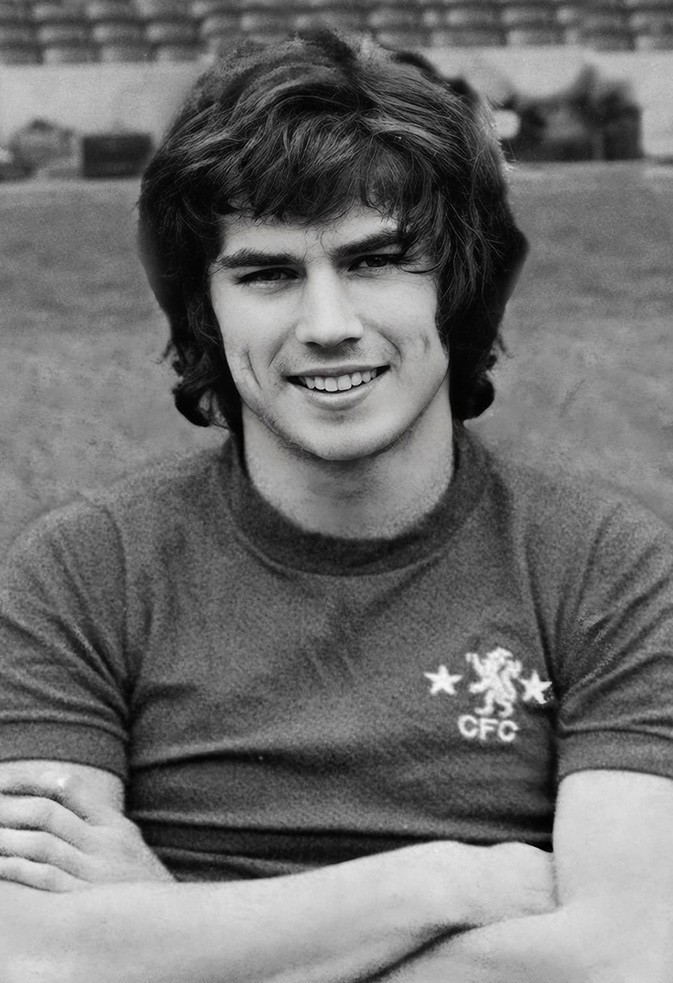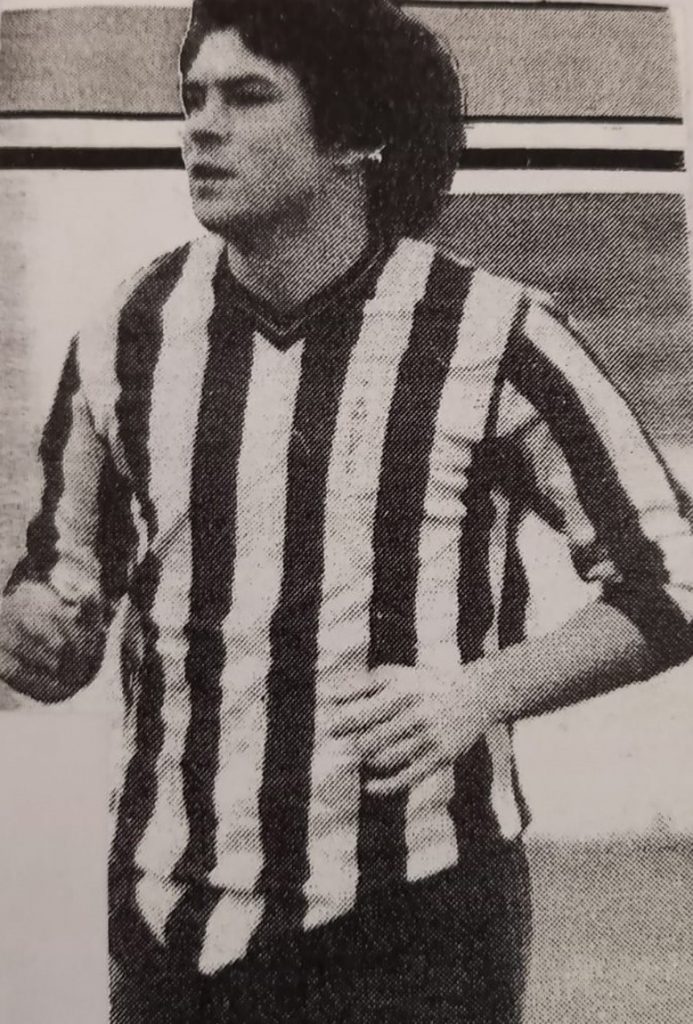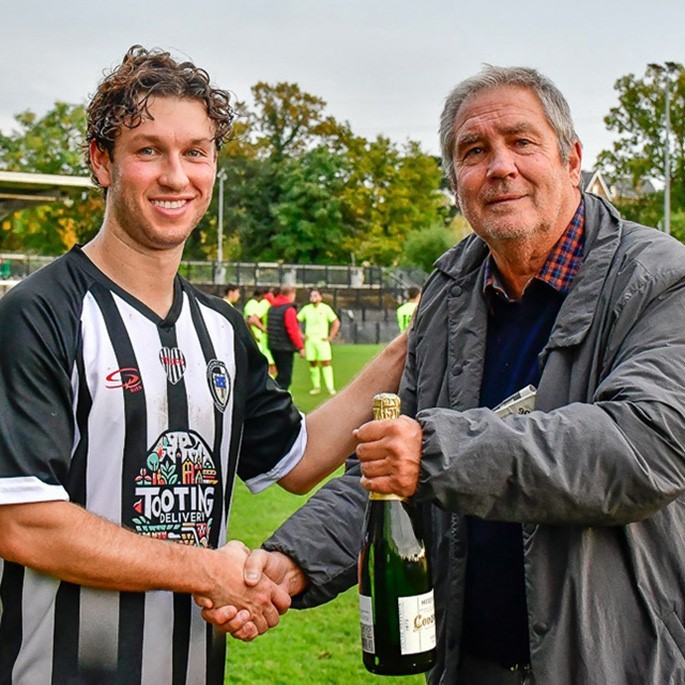Our programme editior Ed Parlett caught up with ex-player and ex-assistant manager Micky Sorensen. Here is his interview which original appeared in the matchday programme against Camberley Town.
Micky Sorensen was a fixture in the Tooting & Mitcham midfield during his various spells at the club in the 1980s, having started his career in the junior ranks at Chelsea. After injury prompted his retirement, he joined the management team at Sandy Lane, as assistant to manager Bob Langford. Now retired and living in Norwich, Micky still watches matches at Imperial Fields as and when he can; he undertakes an annual man-of-the-match sponsorship in memory of his late friend – and Tooting stalwart – Nigel Sarson every October and, with that occasion falling this afternoon, I caught up with Mick to chat about his Terrors memories.
Ed : What was your background, Micky, and how did you come to play for Tooting & Mitcham in the early eighties?
 MS : I’m a local boy, from Ewell, and was taken on by Chelsea as a teenager, playing in the youth team initially. Danny Godwin and Fran Cowley – both future Tooting & Mitcham players – were apprentices alongside me at that time. I signed a pro’ contract when I turned eighteen and, although I never made a competitive first-team appearance, I did play some high-profile friendlies for them as well as many Reserve team fixtures over the next few years. The best player I ever played with was Ray Wilkins, and my toughest opponent was Liam Brady of Arsenal. I left Chelsea in 1975 when I was 20, and drifted into the non-league scene. I signed with Sutton United initially, and was part of the side who made it through to the First Round Proper of the FA Cup in 1975. We got AFC Bournemouth at Gander Green Lane and held them to a 1-1 draw. Unfortunately, we lost the replay at their place 1-0. After leaving Sutton, I went to Kingstonian and then Hitchin Town – joining Tooting & Mitcham when I left Hitchin in 1980.
MS : I’m a local boy, from Ewell, and was taken on by Chelsea as a teenager, playing in the youth team initially. Danny Godwin and Fran Cowley – both future Tooting & Mitcham players – were apprentices alongside me at that time. I signed a pro’ contract when I turned eighteen and, although I never made a competitive first-team appearance, I did play some high-profile friendlies for them as well as many Reserve team fixtures over the next few years. The best player I ever played with was Ray Wilkins, and my toughest opponent was Liam Brady of Arsenal. I left Chelsea in 1975 when I was 20, and drifted into the non-league scene. I signed with Sutton United initially, and was part of the side who made it through to the First Round Proper of the FA Cup in 1975. We got AFC Bournemouth at Gander Green Lane and held them to a 1-1 draw. Unfortunately, we lost the replay at their place 1-0. After leaving Sutton, I went to Kingstonian and then Hitchin Town – joining Tooting & Mitcham when I left Hitchin in 1980.
Ed : What were those early days like; what are the memories that stay with you from that time?
MS: I had very positive impressions early on. The ground at Sandy Lane was one of those great, vast London grounds of which there were so many at the time, though all now – I think – are sadly gone, lost under the anonimity of supermarkets or housing estates or industrial units. But the memories linger on and you can never take those away; even though Sandy Lane had the feel of a ground that had once seen much better days, and the team were struggling to achieve any kind of consistency during much of my time there, the atmosphere inside the stadium on a matchday was still second to none in non-league football – particularly midweek games under the lights.
Before, during, and after matches, many hours were spent in the company of supporters – listening to supporters and mutually consuming copious amounts of alcohol (not before the game, I hope Mick! – Ed) I got on very well with most of the players in those early days, but particularly enjoyed the company of Johnny Keefe and Derek Casey when I first joined the club. The culture in those days for most of the players was – any money you got from the club, you put it back behind the bar on a Saturday night. And the three of us certainly endorsed that policy! Reflecting on the time I spent there as a player brings to mind training nights amongst the dog mess on Figges Marsh, illuminated by the lights of the nearby petrol station because the Groundsman wouldn’t let us train on the pitch! Or five mile runs around Mitcham, stopping halfway round for a pint at the Three Kings. I also remember myself and several other players being reprimanded by the committee of Les Walters and Arthur Gaitt for swinging on the terraces at Carshalton Athletic during a game, somewhat inebriated. Of course, the changing room was full of characters – management and players alike – back then, so it was not unusual for sandwiches, cups of tea, or punches to be thrown; or expletives given out. Times have undoubtedly changed since then, and probably for the better.
Ed: On the pitch, the side were entering a transitional phase. Gone were the famous cup-runs of the seventies, and the next few seasons became a bit of a struggle, culminating in the first relegation in the clubs history toward the end of the decade. What are your thoughts on those difficult times?
 MS: During those early years, we were generally a middle-of-the-table side who flourished at times during a season, and struggled at others. We could beat anybody in the division on our day, but could also lose to anyone if we were off-key. We had a few decent cup-runs around this time, but couldn’t quite match the teams of the previous decade who had played the likes of Swindon Town and Bradford City in the FA Cup; we fell at the final hurdle on two or three occasions when we only needed one more win to get us into the hat for a potential tie against a football league side. It’s a shame, I’d have loved to have played in that sort of fixture at Sandy Lane. Then, during the early part of the 1986/87 season I broke my leg playing for the Reserves and was out for the rest of the season. I came back a year or so later, and even captained the side for a time under Barry Neville for a while, but I never fully recovered and retired from football in summer 1988. My dear friend Nigel Sarson summed up my playing career with these words: ‘not the best player I’ve seen, but at least you know Mick will always put a shift in.’ It’s a back-handed compliment, of sorts – but I’ll take it!. After I’d finished playing, I still turned out for the Reserves occasionally, when needed, as I was asked to assist Bob Langford who was overseeing the second eleven. We had a good side then, and managed to lift the Suburban
MS: During those early years, we were generally a middle-of-the-table side who flourished at times during a season, and struggled at others. We could beat anybody in the division on our day, but could also lose to anyone if we were off-key. We had a few decent cup-runs around this time, but couldn’t quite match the teams of the previous decade who had played the likes of Swindon Town and Bradford City in the FA Cup; we fell at the final hurdle on two or three occasions when we only needed one more win to get us into the hat for a potential tie against a football league side. It’s a shame, I’d have loved to have played in that sort of fixture at Sandy Lane. Then, during the early part of the 1986/87 season I broke my leg playing for the Reserves and was out for the rest of the season. I came back a year or so later, and even captained the side for a time under Barry Neville for a while, but I never fully recovered and retired from football in summer 1988. My dear friend Nigel Sarson summed up my playing career with these words: ‘not the best player I’ve seen, but at least you know Mick will always put a shift in.’ It’s a back-handed compliment, of sorts – but I’ll take it!. After I’d finished playing, I still turned out for the Reserves occasionally, when needed, as I was asked to assist Bob Langford who was overseeing the second eleven. We had a good side then, and managed to lift the Suburban
League title that season. Unfortunately, at first-team level, the 88/89 season was a struggle. Eventually Barry left towards the end of the campaign and Bob and I were asked to steer the team through the closing matches, but we weren’t able to keep them up. We stayed on for the next couple of seasons and managed to steady the ship somewhat, just missing out on a play-off place back to the Isthmian Premier in 1990/91. Only an inferior goal-difference separated us from my former club, Hitchin – which increased the frustration on my part. After that, we felt it was time for somebody else to take the reins, so stepped aside. Managers, like players, are open to differing opinions, and therefore I won’t pass on my views on all the managers I played for, but what I will say is it was no surprise to me that Bob Langford achieved great success at Banstead, on a very limited budget, and now works for the FA.
Ed: I know you still pay the occasional visit to Imperial Fields, particularly at this time of year when you undertake the man-of-the-match sponsorship in memory of Nigel. Given your previous involvement with the Terrors, how do you feel seeing them competing now at the lowest level we’ve ever played at?
 MS: I find it very confusing to understand how things have been allowed to slip to such an extent. OK, we had a few problems with consistency during much of my time at the club, but we were always there-or-thereabouts at the top table of non-league football, with the Isthmian Premier standing alongside the Southern League and Northern Premier League as stepping stones to a potential football league place. To see the club sliding down the divisions the way it has done since then has been tough to witness from afar, but times change and if you don’t change with them it is very easy to find yourselves being left behind. However, it does seem the club has started to find a foothold again, and there seems to be some optimism amongst many of those I chat to, so maybe good times are not too far away again.
MS: I find it very confusing to understand how things have been allowed to slip to such an extent. OK, we had a few problems with consistency during much of my time at the club, but we were always there-or-thereabouts at the top table of non-league football, with the Isthmian Premier standing alongside the Southern League and Northern Premier League as stepping stones to a potential football league place. To see the club sliding down the divisions the way it has done since then has been tough to witness from afar, but times change and if you don’t change with them it is very easy to find yourselves being left behind. However, it does seem the club has started to find a foothold again, and there seems to be some optimism amongst many of those I chat to, so maybe good times are not too far away again.
Having said that, I think players, management and owners of any football club should be acutely aware that they should never take fans for granted. In this day and age, many supporters are getting increasingly disillusioned with the state of the professional game, and the prices some of them are charging. Non-league clubs can provide a wonderful alternative if the product they are offering is attractive.
Ed: Finally, then, what are the key attributes that make the non-league scene a viable substitute for the supposed glitz and glamour of the professional game?
MS: I think the position they hold within a community is unique, and there is a strong sense of camaraderie that just isn’t there at higher levels. Win, lose or draw, we were sharing in our successes – and failures – with people who we saw week-in, week-out. We knew a lot of their names and it’s testament to the loyalty that people have at this level that I see so many faces still at the games who I used to play in front of. A little older, yes, but still recognisable nevertheless. I just think that level of acquaitance is impossible to reproduce as you go higher and higher up the pyramid, where players come and go on little more than a whim, and supporters would be forgiven for taking the same way out. Since I moved to Norwich in 1995, I have tried to get down to three or four games a season and I’m always humbled by the welcome I get when I do.There are so many people I could mention, but have decided to cite just a couple – neither of whom I know well – but who epitomise what Tooting & Mitcham are all about. Tim, who has been behind the goal through thick and thin for as long as I can remember – his booming voice giving out frank opinions to the players and (especially!) the referees. I’m sure one or two of them must dread officiating a Tooting match with his witticisms to contend with. The other character I would like to mention is Lyn Catchpole, who I remember starting her ‘work’ as a steward at Sandy Lane back in the eighties. She’s still there, every game, with a smile on her face and a chat to be had. These two people – along with many more – represent the lifeblood of a club like Tooting & Mitcham and are essential, alongside sound planning and sensible investment, to help get the club back to where it belongs. I’d just like to finish off by mentioning my good friend Nigel Sarson, may he rest in peace. Another who went above and beyond to promote the cause of the club, and without his lasting friendship, I would not have this strong attachment to Tooting & Mitcham.
